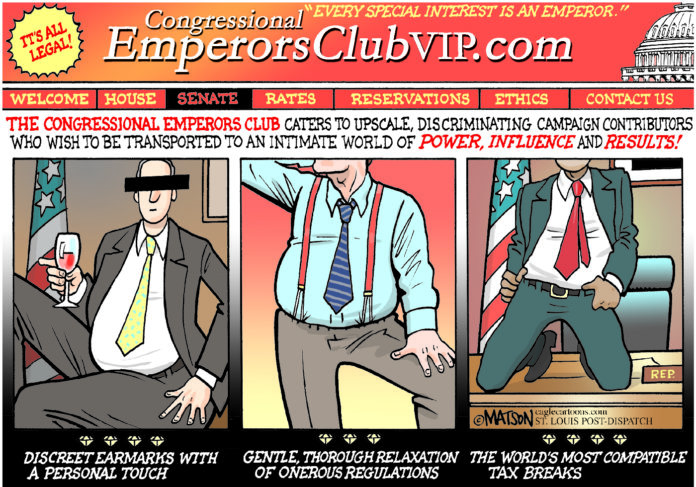BY DAVID PERRYMAN
 Republican President Theodore Roosevelt packed his bags and left the White House in March 1909. Seven and a half years as the country’s chief executive had hampered his ability to enjoy the great outdoors.
Republican President Theodore Roosevelt packed his bags and left the White House in March 1909. Seven and a half years as the country’s chief executive had hampered his ability to enjoy the great outdoors.
That is not to say that he had been locked in the presidential mansion, but his term had been marred by bumpy economic times, extracting focus and attention that otherwise would have been allocated to the enjoyment of those expanses of natural scenery and wildlife habitat that have become his legacy.
In the aftermath of the Panic of 1907, the recurring theme of Wall Street greed and oppression had meshed with the “too big to fail” mentality of New York-based banks and corporations, President Roosevelt had seen big business rebuff his progressive ideas.
Despite opposition, by the time his term ended, he had filed 40 trust-busting lawsuits, secured land for the construction of the Panama Canal, quashed German aggression in South America, won the Nobel Peace Prize for his diplomacy during the Russo-Japanese War and placed 210 million acres of our natural treasures into the National Park Service.
Make no mistake, despite his record of populist and progressive action of regulating railroads, protecting Americans through the Pure Food and Drug Act, protecting natural resources from exploitation and busting large corporate trusts, Roosevelt was no liberal. Theodore Roosevelt called the shots as he saw them through his trademark bipartisan spectacles.
He not only believed in a Common Good, he acted upon it.
On Aug. 31, 1910, the former president returned from African safari long enough to stop by Osawotomie, KS and deliver an address that may rank as in the top four or five speeches in the history of our nation and became known as the “New Nationalism” speech.
By nature, we seek media and literature that incestuously reinforces our limited understanding and restricted perception. We must overcome that natural tendency. The text of Roosevelt’s New Nationalism address is readily available on the Internet and at any library.
If you care about our country, the people who inhabit it and the ones that we hope to leave it to, I urge you to spend a few minutes reading, contemplating and sharing it with others.
Regardless of your political leaning, you will discover that conservatism, progressivism and, yes, even liberalism can and must co-exist to usher in hope for tomorrow. You will discover that many of the dangers raised by President Roosevelt are unfortunately actual conditions that currently plague our political system today.
He argued that our country would have no value unless it was a popular democracy where men are guaranteed the opportunity to show the best that there is in them. He explained that the struggle for human betterment will only be successful through “equality of opportunity” and “destruction of special privilege.”
Teddy Roosevelt also made it clear that a man who lies down and refuses to work does not deserve to be carried, that no man should receive a dollar unless that dollar has been fairly earned, and that “no man can be a good citizen unless he has a wage more than sufficient to cover the bare cost of living, and hours of labor short enough so after his day’s work is done he will have time and energy to bear his share in the management of the community, to help in carrying the general load.”
He asserted that “every special interest is entitled to justice, but not one is entitled to a vote in Congress, to a voice on the bench, or to representation in any public office. The Constitution guarantees protection to property, and we must make that promise good. But it does not give the right of suffrage to any corporation.”
Included was his near prophetic statement that “it is necessary that laws should be passed to prohibit the use of corporate funds directly or indirectly for political purposes; it is still more important that such laws should be thoroughly enforced. Corporate expenditures for political purposes, and especially such expenditures by public service corporations, have supplied one of the principal sources of corruption in our political affairs.”
Roosevelt condemned the “utter confusion that results from local legislatures attempting to treat national issues as local issues,” and the selfishness causing “wealthy special interests to bring national activities to a deadlock.” He expressed his view that the executive power is the “steward of the public welfare,” that the “judiciary be interested primarily in human welfare rather than in property,” and that the legislature, “represent all people rather than any one class or section of the people.”
Oklahoma would be a better place if the political leaders, of both parties, would don a pair of bipartisan spectacles to read, ruminate on and digest the words spoken by Theodore Roosevelt at Osawotomie, KS, 103 years ago, particularly in light of the special interest legislation that will be introduced at Oklahoma’s Capitol next session and the social, economic and political environment that we find ourselves in today.
– David Perryman, a Chickasha Democrat, represents District 56 in the Oklahoma House of Representatives









I agree Theodore Roosevelt was correct the only way to completely survive economics and in the community is for everyone to share the weight and Duty. Every one in the community is to have a job not just living off the System. We should not change to acomidate these people, but to try too change the members of the community that are causing this too happen.